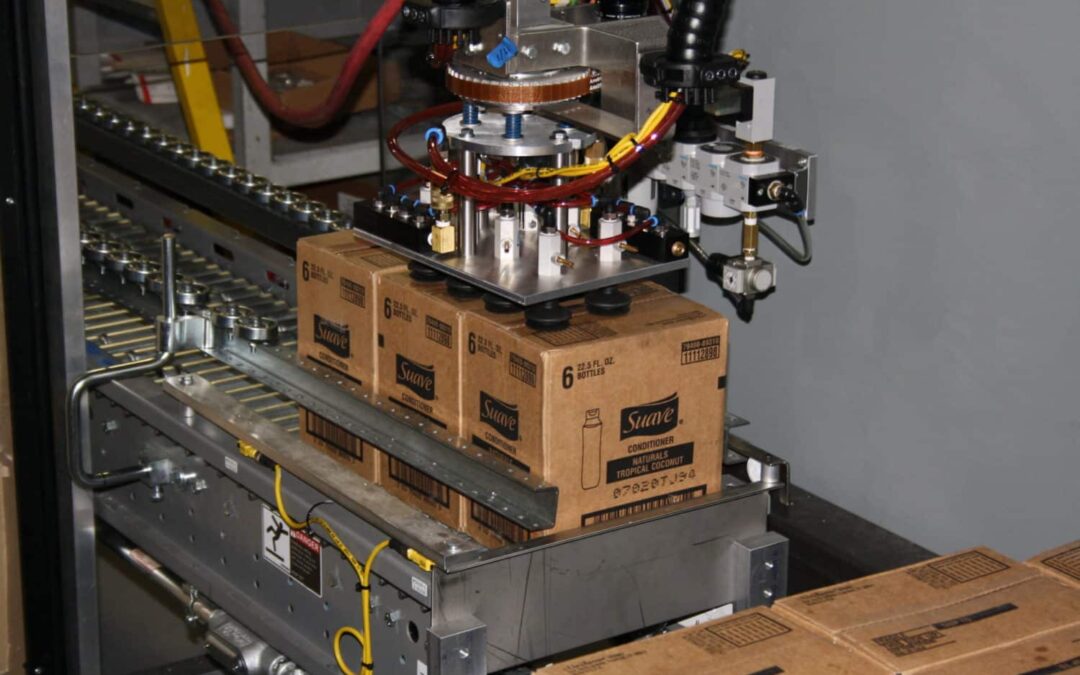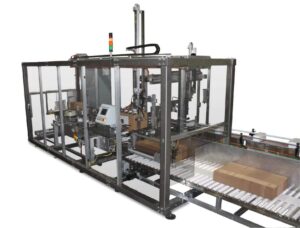If your business involves packaging, the importance of having a reliable box sealer cannot be overstated. Whether you’re in e-commerce, manufacturing, or logistics, a box sealer will ensure that your products are securely packed and ready for shipping. One of the most important tools for ensuring your products are safely secured for shipping is a box sealer. Choosing the right box sealer can feel overwhelming, especially with the wide range of options available. From uniform box sealers that are ideal for businesses using boxes of the same size, to random box sealers designed for operations that handle a variety of box dimensions, each type has its unique advantages. Understanding the different features and capabilities of these machines can help you select the one that best fits your needs.
What Is a Box Sealer?
A box sealer is a machine designed to seal the tops and bottoms of cartons or boxes after they’ve been filled. These sealers use adhesive tape or glue to close the box securely. By automating this process, businesses can speed up their packaging operations, improve productivity, and ensure that packages are consistently sealed without human error.
How Does a Box Sealer Work?
Box sealers typically use adhesive tape or hot melt glue to seal the flaps of a box. They are designed to handle different box sizes and can be adjusted manually or automatically. Here’s how the process works:
- Box Feeding: The box is placed on the conveyor belt and fed into the machine.
- Top and Bottom Flap Folding: The machine folds the top and bottom flaps of the box.
- Sealing: Adhesive tape or glue is applied to secure the flaps.
- Output: The sealed box exits the machine, ready for further handling.
Box sealers can vary in their operation, with some requiring manual adjustments and others being fully automatic. Some machines are designed to handle uniform box sizes, while others can adjust on the fly for different dimensions.
Types of Box Sealers
There are several types of box sealers available, each with its specific strengths. The type of box sealer you choose depends on the nature of your business and the volume of packaging required.
- Uniform Box Sealers
Uniform box sealers are designed to seal boxes of a consistent size. They are ideal for businesses that pack products into the same sized box for every order. These sealers require little to no adjustments once set up, which makes them efficient for high-volume operations.
- Random Box Sealers
Random box sealers can automatically adjust to different box sizes, making them ideal for companies with varying packaging needs. These machines are flexible and can handle different box dimensions without manual intervention, which saves time in fast-paced environments.
- Semi-Automatic Box Sealers
Semi-automatic box sealers require some manual input, such as folding the flaps or placing the box into the machine. While they are more labor-intensive than fully automatic sealers, they are still faster than hand-sealing and offer significant time savings.
- Fully Automatic Box Sealers
Fully automatic box sealers do all the work for you, from feeding the box to folding the flaps and sealing. These machines are the best option for high-volume operations where speed and efficiency are essential. They can handle hundreds of boxes per hour with minimal human intervention.
Key Features to Consider When Choosing a Box Sealer
When selecting a box sealer for your business, several factors should be considered to ensure you’re getting the best solution for your needs.
- Box Size Compatibility
The box sizes that the machine can handle should be a top consideration. Some machines are adjustable and can seal a variety of box sizes, while others are designed for uniform box dimensions. If your operation uses a wide range of box sizes, a random sealer may be the best choice.
- Speed and Efficiency
Different box sealers operate at different speeds, so it’s important to match the machine’s capacity to your business’s output requirements. Fully automatic machines can process a high number of boxes per hour, making them ideal for large-scale operations, while semi-automatic models are more suited to medium-sized businesses.
- Durability
The construction of the box sealer is crucial for ensuring longevity. Look for machines made from high-quality materials that can withstand the rigors of daily use. A durable machine will save money in the long run by reducing the need for frequent repairs or replacements.
- Sealing Method
Box sealers typically use adhesive tape or hot melt glue to seal boxes. Tape sealers are more common due to their lower cost and ease of use. However, if your business requires a more secure seal, hot melt glue sealers may be a better option.
- Ease of Maintenance
Consider how easy it is to maintain the machine. Simple, user-friendly designs often have fewer parts that require regular maintenance, which can minimize downtime and keep your packaging line running smoothly.
Advantages of Using a Box Sealer
Box sealers offer numerous benefits that can significantly improve the efficiency of your packaging process. Here are some of the key advantages:
- Increased Speed
A box sealer can seal boxes much faster than manual sealing, making it an essential tool for businesses looking to boost production rates. Even semi-automatic sealers can speed up the process compared to hand-sealing boxes.
- Consistent Sealing
When sealing boxes manually, there’s a chance of inconsistency, especially in a high-volume environment. Box sealers provide uniform and reliable seals every time, reducing the risk of packages coming open during shipping.
- Reduced Labor Costs
By automating the sealing process, you can significantly cut down on the labor required to seal boxes. Fewer workers are needed to handle packaging tasks, freeing them up for other valuable activities.
- Improved Productivity
With a box sealer, your packaging line will become more efficient, increasing the number of packages that can be processed in a day. This improved productivity can lead to greater customer satisfaction, as orders are fulfilled faster.
- Reduced Waste
Using a box sealer ensures the precise application of tape or glue, minimizing waste. Manual sealing often results in excessive tape usage, which can drive up costs over time.
How to Maintain Your Box Sealer
To keep your box sealer in top working condition, regular maintenance is essential. By following a maintenance schedule, you can prevent breakdowns and ensure smooth operation.
- Regular Cleaning
Dust and debris can build up on the machine, which can affect performance. Regularly cleaning the conveyor belt, rollers, and tape head will prevent jams and ensure the machine runs smoothly.
- Lubrication
Moving parts should be lubricated regularly to reduce wear and tear. Follow the manufacturer’s recommendations for lubrication intervals and the type of lubricant to use.
- Inspect for Wear
Over time, parts of the box sealer may wear down and need replacing. Conduct regular inspections to check for signs of wear on the tape head, blades, and rollers.
- Calibration
Ensure the machine is calibrated correctly for the box sizes you’re sealing. Misaligned parts can lead to inconsistent seals and product damage.
Choosing the Right Box Sealer for Your Business
Selecting the right box sealer comes down to understanding your specific packaging needs. Consider the following questions when making your decision:
- What’s your production volume? If you’re sealing hundreds or thousands of boxes a day, a fully automatic sealer will offer the speed and efficiency you need. Smaller operations may be better suited to a semi-automatic or uniform sealer.
- What box sizes do you use? If your packaging operation uses a range of box sizes, look for a machine that can adjust automatically to different dimensions. For consistent box sizes, a uniform box sealer will suffice.
- What’s your budget? The cost of box sealers varies widely depending on the type and features. Be sure to consider the long-term savings on labor and tape when determining your budget.
- What’s your available space? Some box sealers are more compact than others, so take your available workspace into account when choosing a machine.
Conclusion
Investing in a box sealer can revolutionize your packaging process, making it faster, more efficient, and cost-effective. Whether you’re running a small business or a large manufacturing facility, there’s a box sealer out there to meet your needs. By considering factors such as box size compatibility, speed, and ease of maintenance, you can find the perfect machine to streamline your operations.
AFA Systems offers a comprehensive range of packaging machinery designed to meet the needs of businesses in various industries. Their solutions include case packers, robotic packaging systems, palletizers, case erectors, and sealers, all engineered to improve productivity and accuracy in packaging processes. Whether you’re looking for wrap-around case packers, top-load systems, or end-of-line robotic solutions, AFA’s machinery is built to provide efficiency, flexibility, and consistent performance. Their packaging equipment is perfect for businesses seeking automation and enhanced productivity across the entire packaging line.




